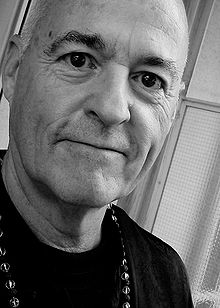- Daniel Odier
-
Daniel Odier (born in 1945 in Geneva), known by his pseudonym Delacorta, is a Swiss author, screenwriter and poet.
With regard to Odier, Anaïs Nin is noted to have written, "He is an outstanding writer and a dazzling poet."[1]
According to a couple of sources, Odier began studies at the school of Beaux Arts at Rome but later chose to focus on writing rather than painting.[2][3] He received his university degree in Paris and was employed by a leading Swiss newspaper as a music critic. He has taught screen writing at the University of Tulsa in Oklahoma where he once resided with his wife, the violinist Nell Gotkovsky.[1] More recently, Odier founded the "Tantra/Chan centre" in Paris (confirmed by his official website as operating from 1995 to 2000), and he has "taught courses on the spiritual traditions of the Far East at the University of California"[3]—which his website also confirms, noting his "workshops and seminars throughout the world."[4]
Odier is best known for the series of his pseudonymous novels which centers around an underage girl named Alba. Throughout the series, Alba engages in an unconsummated romance with an older French man, Serge Gorodish, who provides for her. Together they solve mysteries that are generally caused, at least in part, by Alba herself. The series includes the novel Diva which was later used as the basis for a popular French film of the same name. A number of other films have been adapted from Odier's writings, including Light Years Away (from the novel, La voie sauvage) and Celestial Clockwork.[5] Odier has also written many other books (such as The Rap Factor, about a detective agency in Florida) under his pseudonym. However, the majority of Odier's fiction works, whether attributed to his own name or 'Delacorta,' remain untranslated into English. It is commonly argued that the latter is a result of the greater part of his reception having thus far occurred in predominantly francophone milieux.
Odier is also a teacher of tantra, claiming in his book Tantric Quest, and in his teaching, to have experienced a mystical initiation from a tantric dakini, Lalita Devi, in Kashmir.[4]
Contents
Works
- The Job: Interviews with William S. Burroughs (first book, published in the US in 1969)
- Cannibal Kiss
- Rouge
- Transparence
- Le soleil dans la poche (poetry)
- Nuit contre nuit
- Eclats d'ombres
- Ming
- Népal
- La voie sauvage
- Splendor solis
- L'année du lièvre
- Le milieu du monde
- Petit déjeuner sur un tapis rouge
- Gioconda
- Cécilia
- Le clavecin
- Vijñânabhaïrava Tantra
- Spandakarika
- Paramshiva and his Universal Manifestation
- The Chant of the Sacred Vibration
- Mystical songs from kashmirian tantrism (Lalla)
- Tantric Quest: An Encounter with Absolute Love
- Desire: The Tantric Path to Awakening
Pseudonymous works ('Delacorta')
- Diva
- Nana
- Luna
- Lola
- Vida
- Alba
- The Rap Factor
- Rock
- Somnambule
- Papillons de nuit
- L'illusioniste
- Imago
References
- ^ a b Delacorta (1984). Nana. Summit Books. p. 127.
- ^ French Wikipedia entry: Daniel Odier
- ^ a b Delacorta at Biogs.com
- ^ a b Daniel Odier's Official Webpage: Biography in English
- ^ Daniel Odier at IMDb.com
External links
Categories:- Swiss novelists
- Living people
- 1945 births
Wikimedia Foundation. 2010.

